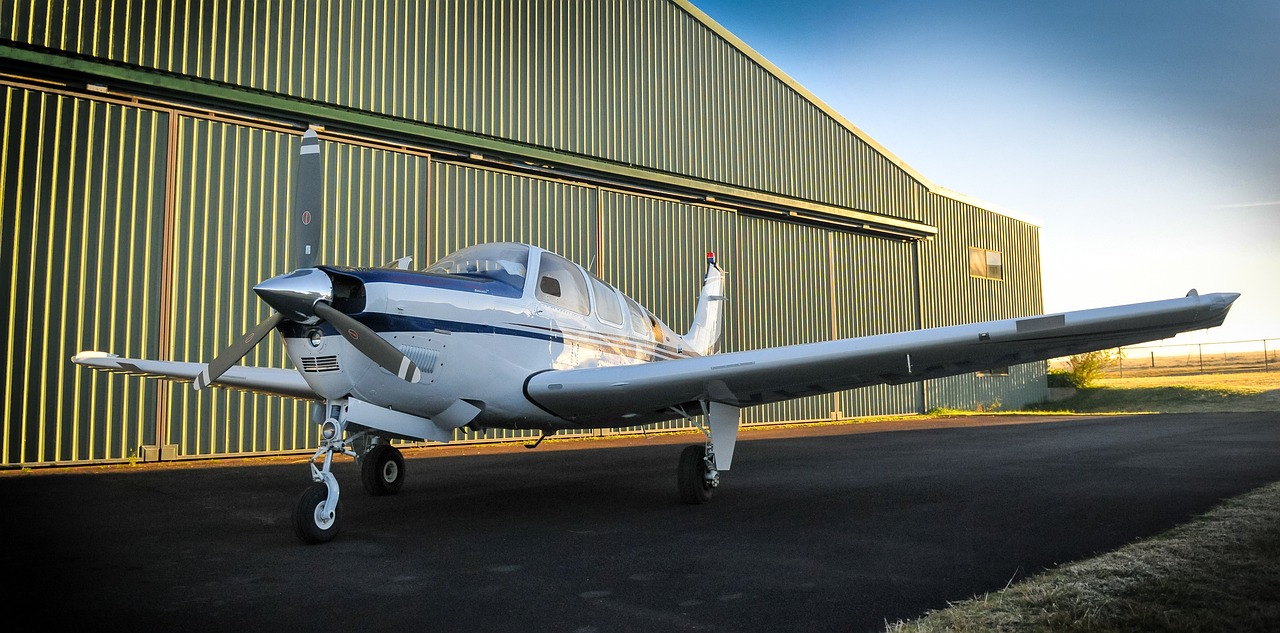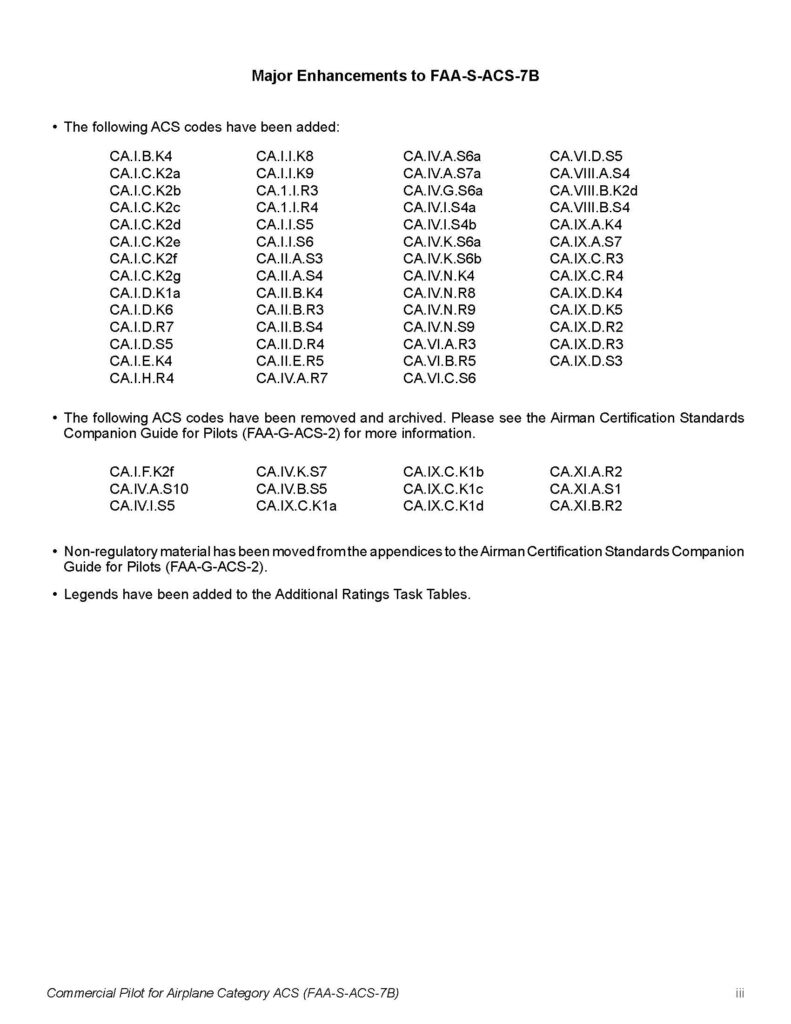2024 FAA ACS and PTS Changes FAQ

Originally posted March 30, 2024 – updated June 16, 2024.
Today, the FAA published updates to its Airman Certification Standards (ACS) and Practical Test Standards (PTS) documents. This post serves to answer several common questions regarding the new ACSes and PTSes, and how they affect you as a FAA certificate candidate (or as an instructor who is teaching candidates).
1. Where can I find the new ACS and PTS documents?
The ACS and PTS documents are on the FAA’s Airman Certification Standards page (https://www.faa.gov/training_testing/testing/acs).
2. What certificates and checkrides are affected?
Basically all FAA pilot and instructor certificates, from Sport up to ATP, with the exception of Remote Pilot. In all, 30 different ACS and PTS documents received updates.
This also affects certificates which are still on the PTS; including Sport Pilot, CFI-Sport, etc. There have been changes to these PTS documents, even though they have not been updated to the ACS format.
The Aviation Mechanic ACS has not been updated in this cycle.
3. I have an FAA practical test coming up! When do these changes take effect?
The effective date is May 31, 2024. If your scheduled checkride is on or after that date, ensure you are using the new ACS/PTS document to prepare. ASA and other third-party publishers will likely produce printed copies that will be available soon after May 31, 2024.
4. Are there any big differences in these new documents?
Yes and no. There are no major new maneuvers required for any of the certificates which we have reviewed (Sport, Private, Commercial, CFI).
However, there are minor changes to how many tasks and elements will be evaluated, especially in the Flight Instructor ACS. Some items have also been reorganized. See the change list in each ACS/PTS for details.
In the Private ACS, there are a total of 87 minor changes; of which, about 70 affect airplane single-engine land. Thanks to Gary Palmer for doing the legwork on the line-by-line comparison. None of these changes represent significant new maneuvers or tasks. See FAQ #5 below for more information on what some of these changes look like.
The new Instrument ACS and ATP ACS removes the requirement for the two nonprecision approaches to use two different types of systems. This falls under Area of Operation I (Instrument Approach Procedures), Task A (Nonprecision Approaches) in the Instrument ACS. Instrument candidates will still need to perform two approaches, but they can be of the same type (VOR, for example). (Hat tip to Mark Kolber, thank you!).
5. What's an example of a "minor change?"
Let’s look at the Private Pilot ACS for an example. Area of Operation I (Preflight Preparation), Task C (Weather Information) has been modified. Previously, candidates were tested on Knowledge Element PA.I.C.K2, explained as “Acceptable weather products and resources required for preflight planning, current and forecast weather for departure, en route, and arrival phases of flight.”
With the new ACS revision, PA.I.C.K2 remains, but now has sub-elements itemizing the specifics that a candidate should know. These include:
PA.I.C.K2a a. Airport Observations (METAR and SPECI) and Pilot Observations (PIREP)
PA.I.C.K2b b. Surface Analysis Chart, Ceiling and Visibility Chart (CVA)
PA.I.C.K2c c. Terminal Aerodrome Forecasts (TAF)
PA.I.C.K2d d. Graphical Forecasts for Aviation (GFA)
PA.I.C.K2e e. Wind and Temperature Aloft Forecast (FB)
PA.I.C.K2f f. Convective Outlook (AC)
A note further explains how this will be tested: “If K2 is selected, the evaluator must assess the applicant’s knowledge of at least three sub-elements.”
This set of changes represents a total of six new elements, but fundamentally, should not affect how candidates are preparing for the Private Pilot practical exam. All six of these items are fundamental aviation weather products, and Private Pilot candidates should have been (and should continue to be) learning about all of them during their training.
Enumerating specifics in this manner helps assure consistency across test administration. It also helps candidates prepare by identifying items that the FAA has deemed important to review.
6. Should I study differently as a result of these changes?
Not really. The source material covered by the ACS and PTS documents we’ve reviewed hasn’t changed. If you are reading and retaining the information provided by the various FAA source documents (Airplane Flying Manual, Pilot’s Handbook of Aeronautical Knowledge, FAR/AIM, etc.), you should have no trouble being tested under either version of the testing standards document.
However, if you are beginning your studying, it would be wise to make sure you are using the correct ACS or PTS as your study guide. You will want to go line-by-line through the appropriate ACS or PTS and confirm that you are knowledgeable on each item. As seen in Item No. 5, the FAA is now telling you exactly what weather products you’ll be expected to know. There’s no excuse for not being familiar with the six sub-elements they’ve itemized!
See our Checkride Prep Guide for our recommended study strategy.
7. I started studying with the old ACS (or PTS). What do I do?
If you’ve done the majority of your review under an old ACS or PTS, but will not be taking your checkride until after May 31, 2024, the good news is that you have plenty of time to adjust to the new documents!
Use that time to go line-by-line through the new ACS/PTS to ensure you are knowledgeable on each item.
The FAA has also provided a change list, like the one shown at right from the Commercial ACS. Consult this change list as a supplement to your line-by-line review. Make sure that you’re up to speed on these new items as they are likely to be emphasized by examiners.
8. Where did the applicant checklists and other supplementary information go?
Non-regulatory material (such as information on knowledge tests, knowledge test reports, and applicant checklists) has been moved from the appendices to the Airman Certification Standards Companion Guide for Pilots (FAA-G-ACS-2). You can find it on the Airman Certifications Standards page, or download it directly here.
9. I took my knowledge test a few months ago, but my checkride isn't until July. Do I need to take a new knowledge test?
No. Your test results are valid and will be for 24 calendar months from the date of your knowledge test.
The question banks for the knowledge tests are updated a few times a year. It would not be surprising to see some new questions with elements from the updated ACS or PTS show up in knowledge tests administered after the active date of the new testing documents (May 31, 2024).
Expect to be asked about your deficient areas from your knowledge test during your checkride, as is standard practice.
10. If I take a mock checkride with MockCheckride.com, which ACS (or PTS) will you use?
As of May 31, 2024, we have updated our materials to account for these new documents. We will use the most current ACS or PTS documents to conduct your mock checkride.
Looking to arrange a mock checkride with us? Schedule now!

